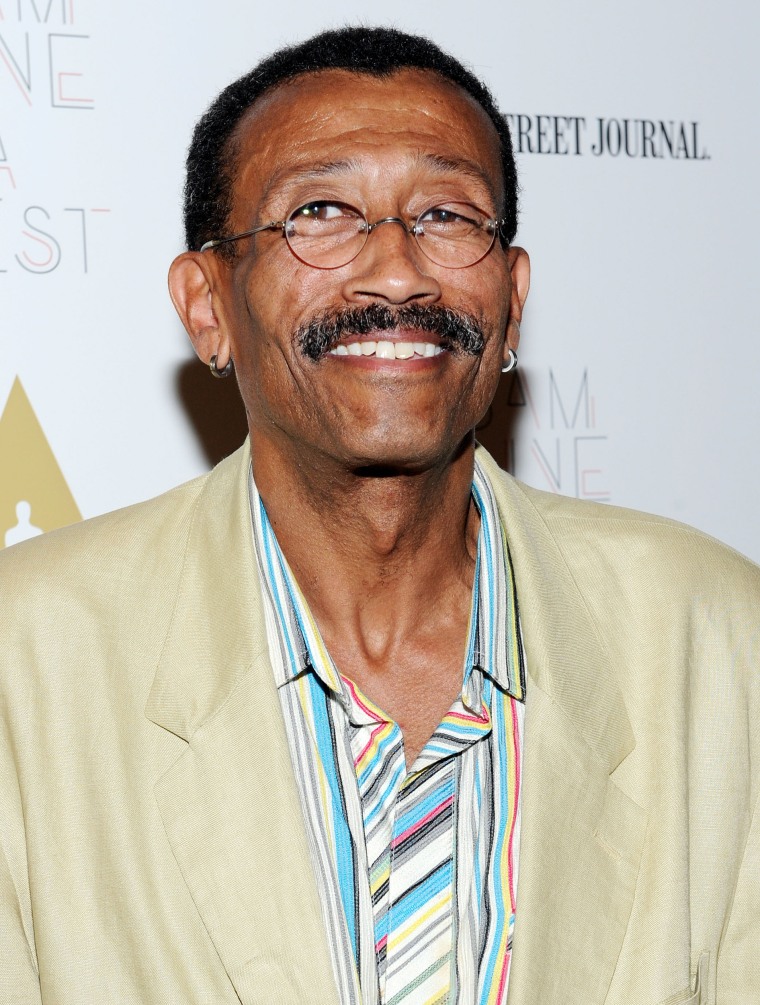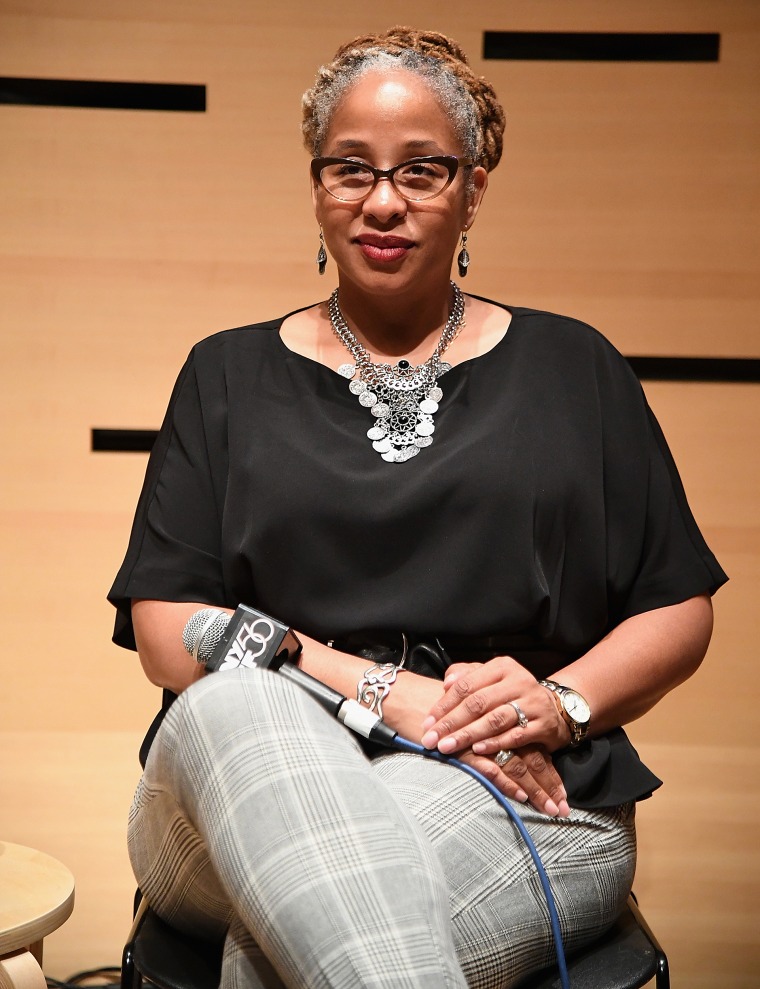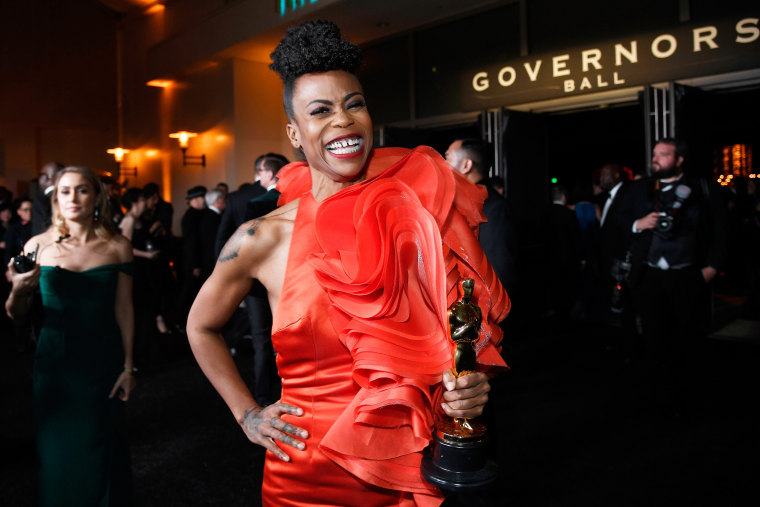At the 2019 Oscars, Hannah Beachler made history by becoming the first black person to win the award for best production design for Marvel’s "Black Panther." Production designers have the privilege of traveling to exotic locations and constructing worlds from scripts, but also are responsible for managing large production teams.
From overseeing set building to designing elaborate superhero scenes, production design requires knowledge of architectural style and precision and an understanding of visual storytelling. Some designers have prestigious degrees in art or design; others have learned on the job. All have spent years honing their skills.
NBCBLK interviewed three African-American production designers — Hannah Beachler (also of "Lemonade"), Wynn Thomas ("A Beautiful Mind," "Cinderella Man," "Crooklyn") and Deirdra Govan ("Sorry to Bother You") — and asked them about their influences, how they got into the business and what Beachler's Oscar win means for the future of the industry.
Are there other black production designers — past or present — who have influenced you?
Govan: I just finished working on a project with Bruton Jones. When you work with someone like that you just become awestruck because it’s us creating these worlds and you don’t really get that kind of attention. One of my dear friends, Toni Barton, she’s an incredible production designer; she was a professor at New York University and she’s also one of my mentors.
There’s a camaraderie when you see us in the art department because it’s not that often that you see us. So for people to know and understand that we have the skillset of architectural drawing, drafting, for some people, it’s a shock. But those of us who have been in the shadows for so long, this is what we do and we go about our work very quietly.
Beachler: Wynn Thomas certainly was the representation I saw that kept me going in this craft. Later in my career, he mentored me as he has done for thousands of black creatives in the film industry over the last three decades. Honestly, before Wynn there were not any African-American production designers that I knew of or saw doing the work, definitely not at Wynn’s level working with huge directors — of course Spike Lee, but also Ron Howard, Robert De Niro, Barry Levinson and Tim Burton to name a few. Wynn is the first; we stand on his shoulders. Toni Barton is a production designer that is doing amazing work and has been for years. She’s another example of a black creative in this craft moving through the industry and carving out a career.
Thomas: I am the first African-American production designer.

So you didn’t have the advantage of having other black production designers to look up to. Did that affect you?
Thomas: I didn’t really need that. I was interested in doing the job, and I have to say I never thought about the hurdles in my way. I was just focused on being the best that I could be.
How did you get into production design?
Beachler: I came to film wanting to be a director, and after a while realized what I responded to most in the storytelling was the canvas/environment. I understood what that canvas was telling me about the emotional and mental landscape of the story. I didn’t have words for that in the beginning until one of my professors told me how much he loved the art direction in my short films. I thought, oh what is this art direction? Production design? Who are these people? What do they do? A lot of the same questions people ask me now. And one day a college friend was working on a made-for-TV movie as the production designer and asked if I could help out. After that, I never looked back.
Thomas: My background was in the theater. I went to college to study stage design. I worked at various positions in the theater. I started designing sets for a very famous off-Broadway theater company called Negro Theater. I worked in the theater primarily and got tired of being poor and decided to pursue movie work. I volunteered for my very first job when I was a volunteering for a movie called “The Cotton Club,” and I got hired within four hours of being a volunteer. I was working with a world famous production designer, a man named Richard Sylbert. He was my first of many teachers.
Govan: I have actively been in the industry and known as a costume designer for over 20 years, but in between my time of stepping in and stepping out of the industry I knew that I wanted to take a bigger creative scope in the world. I had consulted with a friend of mine who is a production designer. I had a friend who was an interior architect and designer, and she does construction and had done some design in her earlier career, and I decided to go get my master’s degree in interior design and architecture and focus on set design in commercial spaces and creating experience through environments. I had an opportunity after going to Sundance 2012 to meet with a colleague and he and I became really good friends and I production designed one of his films. It was a great opportunity. So many of my friends are production designers so it was a very solid fit.

What would you say to a person wanting to break into the business? What’s the most important skillset required for the job?
Beachler: I think everyone’s path into the film industry is really unique to them. Every story is different, because you have to find your own right time, decide where you’re going to live, figure out how to be resourceful, etc. With that said, I always tell people coming into the business to be persistent, give yourself time, write a list of goals every year of what you want to accomplish that year even if it’s one or two things and focus on reaching those goals instead of thinking you have to be at the top in a week. You need to have a vision, you need to have drive and you need to be someone who feeds on evolving and learning all the time. You can learn the philosophy and physics of color, space and form; you can learn how to paint, weld, etc. But the skill set of seeing and understanding different people and cultures, being aware of who you are as a person and the role you play in the world are the most important skill sets, I found, for my aesthetic.
Thomas: It’s a job that requires a lot of different skills. You need to be an architect; you need to be an interior designer; you need to be a historian; you need to be a diplomat because we are working with every single department, but we interface with almost every single department on the film.
What’s been the most monumental work experience you’ve had?
Beachler: Everything I work on is the most monumental experience honestly. There’s not one that outdoes the other. Now stories? What’s the most monumental story from a project I worked on, I’d have to say “Lemonade.” Beyoncé sang a cappella one night at Destrehan Plantation while filming for her song “Freedom,” and I will never forget that moment for as long as I live, the most powerful moment I’ve experienced. It will always bring me to tears thinking about it, as it did the evening it happened.
Thomas: I did a movie called “Cinderella Man” that Ron Howard directed, a wonderful movie about a boxer named Joe Braddock. It’s a story of a man who will do anything to take care of his family. I loved it because it’s a period film. Where my work was successful is that you really get a sense of stepping back into time and place. It was my second film with Ron Howard.
Is there anything about your upbringing/family life that you think contributed to you deciding on this career?
Beachler: My dad, who is now passed, was an architect. And though I didn’t know it at the time — I wanted to be a fashion designer — but all the things he taught me about building, being at his office and taking down the hundreds of sample books of wallpaper, carpet, paint colors and opening them up and running my hands over the textures and looking at all the colors and designs, and him taking me to construction sites and walking through and around all the framed-out walls as he would explain where the different rooms would be in the space.
Govan: I have to say it was my mother. I had a family who was very supportive in feeding my artistic talent. My father passed away when I was young, but my mother would take me to the movies every weekend. My mother encouraged me to be that explorer, and I came to New York at 18 from Texas; it’s an eye-opening experience and it changed my life. I have a strange sense of always being an explorer. When I was a child, I wanted to be an archeologist because I just love the whole idea of Indiana Jones digging in the ground and uncovering a lost civilization. And for me, when I travel, that’s how I feel. It’s like what am I going to discover next.
What about the Oscar win? How do you think it will change things moving forward?
Beachler: Well, I’m hoping people will consider me for projects they may not have previously. That’s really the most I’m hoping for as far as how winning an Oscar will change things. At the end of the day, I am still very vocal about the stories, projects and people I work with and will continue to seek out stories that challenge people, not only who watch the films but who work on them, too. I’m stubborn that way.
Govan: Hannah winning was such an incredible moment. I can’t tell you the wellspring for myself and a few of us who were just like completely floored. We’re doing the work, and we’re slowly getting recognized for that work.
Thomas: The world has changed tremendously. There was a time when I was the sole person for many, many years. With Hannah’s win, my hope is that people who saw the show will now be curious about what that job is. I kind of look at my career as a relay race. There are many black and brown men and women who are now taking that baton much further. There are now many people who are moving forward. It’s fantastic. And Hannah’s win is historic because not only was she the first female to design for a Marvel movie, but she was the very first black production designer to win. I was there at the middle of the race, now someone else has taken the baton.
